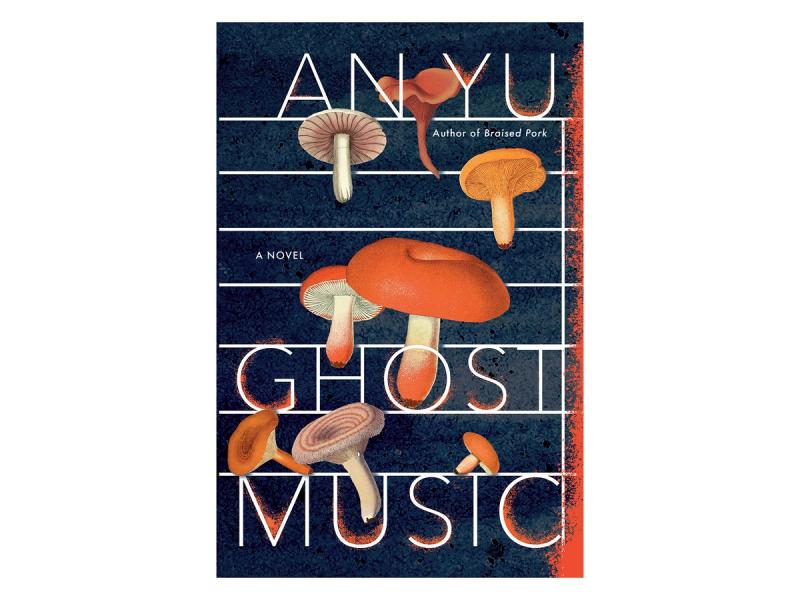
The Eerie, Dreamlike Piano Melodies Behind An Yu’s Latest Novel
An Yu’s latest novel, Ghost Music (Grove Atlantic), tells the story of Song Yan, a former concert pianist whose domestic life starts to cave in when her husband refuses her pleas to have a child. Beginning with unsolicited parcels of mushrooms arriving at her door, Song Yan’s world devolves into the phantasmagorical as she is slowly led to the discovery of a long-vanished musician, the once world-famous pianist Bai Yu. Throughout the story, eerie, dream-like piano melodies guide the reader between the real and surreal, and between Song Yan’s conscious and subconscious.
For Yu, who wrote the novel while sheltering in place in Vermont during the early months of the pandemic—half a world away from Hong Kong, where she’s based—writing the story was as much an escape from this reality as it was an ode to her own two-and-a-half-decade-long relationship with the piano. “Ghost Music is really a love letter to classical music,” she says. Weaving in both personal favorites and pieces from her own repertoire, as well as certain aspects of music history (such as the protagonist’s obsession with the music of the 19th-century German pianist Clara Schumann, whose personal life mirrors that of the protagonist in many ways), Yu employs music almost as a literary device, a bridge of sorts not only between the various realities within the novel, but also between the novel and the real world. “I love the interplay between plain old words on a page with elements that appeal to the human senses—whether it’s music, or food, or art—because, in the end, a novel is all in the imagination,” Yu says. “Pairing that with sensual stimulation creates a novel or a story that is so much more layered and interesting.” (Yu similarly incorporates these elements—particularly food—in her mystifying debut, Braised Pork, which came out in 2020.)
We recently asked Yu to put together a playlist of the piano music that inspired the novel. Here, her selections and musings about her personal connection with each piece.
Listen to Yu’s Ghost Music playlist on Spotify.

“Rêverie, L. 68” by Claude Debussy (performed by Lang Lang)
“This is one of the earliest Debussy pieces I played when I was a child. The melody flows like magic, like it isn’t entirely grounded in reality. Lang Lang’s interpretation is delicate. Each note lingers softly like sequences in a dream.”
“Piano Concerto No. 3 in C Major” by Sergei Prokofiev (performed by Martha Argerich)
“Extremely witty, this piece keeps you surprised, like an enchanted forest. A list of piano music cannot be complete without a performance by Martha Argerich. It’s absolutely mesmerizing to watch her perform.”
“Variations on a Theme of Robert Schumann” by Clara Schumann (performed by Konstanze Eickhorst)
“Clara Schumann is a musical genius, yet too often, she is remembered only as being Robert Schumann’s wife. After her husband died, she stopped composing and focused instead on her performing career and her family. She was instrumental in getting Robert Schumann’s compositions the fame they enjoy today. In many ways, the protagonist of Ghost Music sees herself in Clara Schumann’s life.”
“Piano Concerto No. 2 in C Minor” by Sergei Rachmaninoff (performed by Gary Graffman and the New York Philharmonic)
“Gary Graffman’s performances never cease to enthrall me. Here he plays one of my favorite pieces.”
“Sonatas and Interludes for Prepared Piano” by John Cage (performed by Maro Ajemian)
“I’m rather obsessed with John Cage’s music and philosophy (not to mention his fascination with mushrooms). His idea that music can be open to chance—to drastically different interpretations—is something that hugely inspires my writing. There is something so liberating about the thought that art can be used to simply observe rather than create.”
“Nocturne in E-flat major” and “Nocturne in B-flat minor” by Frédéric Chopin (performed by Yundi Li)
“I listened to Chopin’s nocturnes extensively while working on Ghost Music. Inspired by the night, these pieces are perfectly fitting for a novel about secrets and memories.”
“Piano Sonata No. 8 in C minor - ‘Pathétique’” by Ludwig van Beethoven (performed by Claudio Arrau)
“A groundbreaking piece that bridged the Classical and Romantic periods, this sonata expertly moves through a range of emotions and moods. In my opinion, it’s one of the best pieces of classical music.”
“Piano Sonata No. 3 in B minor” by Frédéric Chopin (performed by Mitsuko Uchida)
“This is Chopin’s last piano sonata, which he never had a chance to perform. It’s filled with a deep feeling of longing and sadness of a life that was about to reach its end.”
“Liebestraum No. 3 in A flat” by Franz Liszt (performed by Leif Ove Andsnes)
“Based on an 1829 poem by [the 19th-century German writer] Ferdinand Freiligrath,
‘Love as long as you can!’, Liszt masterfully reflects the eternality of love and loss in this complex and ingenious nocturne.”
“Piano Sonata No. 21 in B-flat major” by Franz Schubert (performed by Alfred Brendel)
“Something makes me come back to this piece time and time again. Perhaps it is the feeling of wandering, curiosity, and openness that Alfred Brendel is able to capture so well in this rendition.”